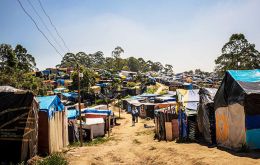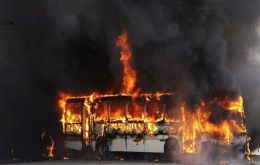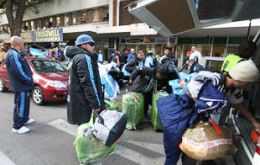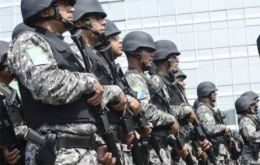MercoPress. South Atlantic News Agency
Tag: 2014 FIFA World Cup
-
Wednesday, May 7th 2014 - 07:11 UTC
Sao Paulo offers 22.000 dollars rewards to whoever turns in data on criminals

With just over a month left for the 2014 World Cup kick off in Brazil, the governor of the state of Sao Paulo launched the Regional Reward program which will pay 55.000 Reales (approximately 22.000 dollars) to anyone providing useful information to help to solve crimes and track perpetrators.
-
Thursday, May 1st 2014 - 07:33 UTC
Brazil raises taxes on beer and sodas; primary surplus slightly down in March

The Brazilian government will raise taxes on beers, sodas and other beverages in a move that will raise an extra 1.5 billion Reais (674 million dollars) in revenue to help meet the fiscal savings goal. Earlier this month, the government had already announced a tax hike on beer to bolster fiscal accounts that have been hit hard over the last three years by rising subsidies, higher spending and an economic slowdown.
-
Monday, April 28th 2014 - 23:40 UTC
FIFA's Valcke downplays 'favelas' violence: “finally we will be talking about football”

FIFA secretary general Jerome Valcke downplayed recent violence in the favelas of Rio de Janeiro as a threat to the upcoming World Cup. The city was the scene of violent outbursts last week when a dancer was found dead with his friends and family blaming the killing on the police.
-
Saturday, April 26th 2014 - 06:05 UTC
Protestors interrupt Rousseff's speech and pledge to torpedo the World Cup

President Dilma Rousseff was repeatedly interrupted while giving a speech by hecklers protesting the coming World Cup hosted by Brazil and who are demanding more funds should be invested in health care, education and improved transportation.
-
Tuesday, April 22nd 2014 - 06:40 UTC
World Cup host city police back to work but number of slain people climbs to 39

Three more people were killed in the capital of the Brazilian state of Bahia and local media reported that police officers were unavailable at most stations, although a two-day strike that affected Salvador-Bahía has been officially lifted.
-
Monday, April 21st 2014 - 07:38 UTC
Killings and riots in Rio do Janeiro; Army patrolled Bahía can't control crime

Hooded youngsters blocked one of Rio do Janeiro's main highways connecting with neighboring Niteroi and set on fire several buses and vehicles to protest the killing of two youths during weekend police operations in the shanty town (favela) of Caramujo. To the north in Salvador-Bahía, Brazilian army patrolling is unable to control crime.
-
Monday, April 21st 2014 - 06:35 UTC
Uruguay, team and country are unified behind coach

The following piece was published by the NYT 18 April edition and is dedicated to Uruguay's football tradition and history. Uruguay's population is only 3.4 million but has an incredible record in world and regional cups victories, both with its national team and in clubs' competitions.
-
Monday, April 21st 2014 - 06:28 UTC
Brazil attempts to combat dengue with GM mosquitoes

The world’s largest ever swarm of genetically modified mosquitoes has been released in a Brazilian town to combat dengue -- a leading cause of illness and fatality in several Mercosur countries, except for Uruguay.
-
Thursday, April 17th 2014 - 08:09 UTC
Argentina court prevents supplying Brazil with football hooligans intelligence

Notorious Argentine “barras bravas” football hooligans can travel to the World Cup without intelligence being passed on beforehand to hosts Brazil, a court has ruled. The court in Buenos Aires said that the Argentine government is not allowed to tell another country personal information about its citizens, a lawyer for the United Argentine Fans (HUA) supporters' group said on Wednesday.
-
Thursday, April 17th 2014 - 07:59 UTC
Brazil sends army to World Cup host city following police strike and widespread looting

Brazil's government ordered 5,000 army troops to one of the host cities for the coming World Cup to provide law and order after a police strike led to civil unrest and looting.On Wednesday, the troops entered Salvador, the capital of Bahia state in northeastern Brazil, the state where police began striking on Tuesday night followed by the ransacking of shops and supermarkets, according to local reports.
